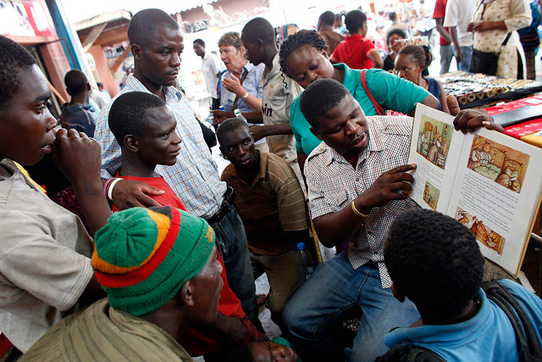 |
 |
 |
 |
Newsletter #53 - March 2015
Click here for PDF version |
|
 |
 |
| Focus on Lubuto outreach |
 |
"The Soweto Market in Lusaka is a huge, crowded collection of vendors' stalls and tables selling every kind of food and goods. It is noisy, busy, and a bit intimidating to a visitor who is more accustomed to modern shopping malls! The boys who hang out there are very lost, both in the homeless sense and in the fog of fumes from the “glue” they sniff from discarded water and soda bottles, but their reaction to the Lubuto outreach staff is no different from that of the younger street children. The day we visited Soweto, the group that quickly gathered around Kenny and Brenda were all teenage boys. They were so eager for attention from caring persons who had come not to threaten, abuse, or chase them away but to read, counsel, and interact with them that it hardly mattered what book Kenny was sharing. It was as if for the short time we were there, the boys could be transported from the hopelessness of their daily life to the possibility of the safe and nurturing environment that the Lubuto Library and Fountain of Hope offers." –Lubuto board member Sally Sinn, on her visit to Lubuto libraries in November 2014
When Jane and Sally witnessed the unique outreach programs that the staffs at Ngwerere and Fountain of Hope libraries have developed, they knew they were seeing a completely new kind of library outreach – one that fully engaged every young person who encountered it, and reached youth who would never imagine going to a library. Our dedicated outreach team has quickly adapted to serve the areas surrounding all three Lubuto libraries. While Kenny, Brenda, Besa and others continue to reach every corner they can in Lusaka, Ndala recently moved down to Nabukuyu to reach beyond the walls of the Mumuni Library. Our outreach coordinators identify places in each community where vulnerable children might be who might not know about our libraries, or may not be able to visit them. Sessions have been held at playgrounds, local schools, markets, churches, and even homes.
Outreach activities generally consist of a combination of story readings, educational games, children's rights discussions, mentoring, and singing and dancing exercises, but they are dynamic and individually tailored to best resonate with the children and youth encountered on each visit. Our outreach effectively supports Lubuto's objective to foster a nurturing environment where children are given a voice and encouraged to express themselves. Among the many positive outcomes we regularly see is increased interest in reading and listening to books, participation in Lubuto programming, and stronger focus on formal education, including re-enrollment in school. Furthermore, our mentoring outreach has resulted in many children reconnecting with estranged family members and becoming more engaged with their communities.
Although our outreach has been largely successful, we have also experienced challenges in working with different target groups. Soweto Market—near Fountain of Hope Library—is especially where we engage with Lusaka’s street children. They are often traumatized and fundamentally alienated from society, and their trust is not easily earned. With guidance from former street children, our outreach team has learned how to relate to and connect with street youth. Although they may not be interested in using our library’s services immediately, or even ever, we are dedicated to finding ways that we can help put their lives on a positive track. We don't measure outreach success merely by the percentage of participants who later visit our libraries, but rather by the quality of human interaction and inspiration that helps the most marginalized youth realize that they are valued.
|
|
 |
 |
 |
| Outreach in rural Zambia |
 |
When we opened the Mumuni Library in November 2014, we knew that a rural area would need a new approach to outreach. Life in rural Zambia is very different than in the large urban center of Lusaka. Ndala is leading us in learning what kinds of outreach services are needed in the communities surrounding the Mumuni Library. Many children in Nabukuyu attend outreach activities with their mothers. These women are often too busy to visit Mumuni Library, but they are happy to attend events held in their own communities. Ndala embraced their presence and encouraged the mothers to visit Mumuni. Recently, a group of 12 mothers between the ages of 16 and 23 came to the library. These women had only reached the seventh grade but were very interested in learning how to use computers. Ndala ended up showing the women the book Zilengwa Zya Batonga by M.S. Chidwayi, which reflects their Tongan culture. They were so enamored of the book that they returned to Mumuni to read it again. They now come about once a week, taking part in LubutoLiteracy lessons and telling traditional stories to local girls.
One aspect of outreach that Ndala focuses on in Nabukuyu is encouraging children—with a strong emphasis on girls—to participate in the activities. He explains that “children and adults in Mumuni find it hard to open up, especially when you ask them to come to the library. They appear to be shy and tend to think that it’s a place for those in school only.” Nabukuyu girls are particularly timid when they are in groups with both genders. He has therefore adapted programming to specifically address self-expression for girls. Ndala is thus able to use outreach sessions to frame the library in an accessible and welcoming way, and to demonstrate that Lubuto offers a non-judgmental space where children are free to be themselves both on-site and off-site.
|
|
 |
 |
| A rural outreach visit |
 |
Every Wednesday, Ndala leads outreach activities in surrounding villages for Mumuni Library. One of the places he goes to is a village called Njola, a full hour’s walk from Mumuni. Although this village is far, it is a crucial outreach location because it is one of the largest and busiest villages in Nabukuyu. Many young people in Njola have dropped out of school for a variety of reasons, including failing government examinations, work, early motherhood, early marriage and parental influence. However, despite these roadblocks to formal education, many of these children are still interested in learning and community activities.
At each outreach session, Ndala first introduces himself, and begins by playing games in order to make children more comfortable. Afterwards, he goes into more detail about Lubuto’s services and offerings. Following the brief informational introduction to the library and its services, story time will generally begin. To wrap up the session, all outreach participants are invited to visit our library and to discover new books, but also to attend future outreach sessions. Often the vast distances between villages in Nabukuyu—as well as other time constraints—prevent children and youth from physically visiting the Mumuni Library. Ndala has therefore worked hard to effectively bring Lubuto and many of its services to the surrounding communities.
|
|
 |
 |
| Meet the Lubuto community: Gideon |
 |
14 year-old Gideon (not his actual name) was inspired to visit Ngwerere Library after attending a Lubuto outreach session where the book the Boy who Harnessed the Wind by William Kamkwamba was read. During story time at the Kafwa Drop-in Centre—a local school—Samuel was very enthusiastic and had many questions about windmills. What are they? Do we have any in Zambia? Can he see a windmill in person? He was so driven to learn more about windmills that he came to Ngwerere Library the very same day. After being taken on a tour of the library, Gideon was excited to read the Boy who Harnessed the Wind again with the librarian.
Gideon continued to visit Ngwerere and he became interested in LubutoLiteracy programs. In February, Gideon started the Cinyanja reading lessons on our computers. After completing the full course of reading lessons in Cinyanja in a little more than a month he decided he wanted to repeat the reading lessons in Bemba. Gideon attributes newfound computer competency to Lubuto. He was initially afraid of damaging computers and did not know how to use a mouse. Lubuto's outreach and library teams gave him the self-confidence and tools to successfully further his reading and technology skills.
|
|
 |
 |
 |
 |
 |
Volunteer of the Month
Our March Volunteer of the Month is Ann Sweeney. An SLA colleague of Jane’s, Ann was one of Lubuto’s very first volunteers. |
 |
 |
|
 |
 |
| |
Copyright © 2015 Lubuto Library Partners, Inc.
The Lubuto Library Project is exempt from U.S. Federal income tax as a public charity
under Section 501(C) (3) of the Internal Revenue Code. |
| |
|





